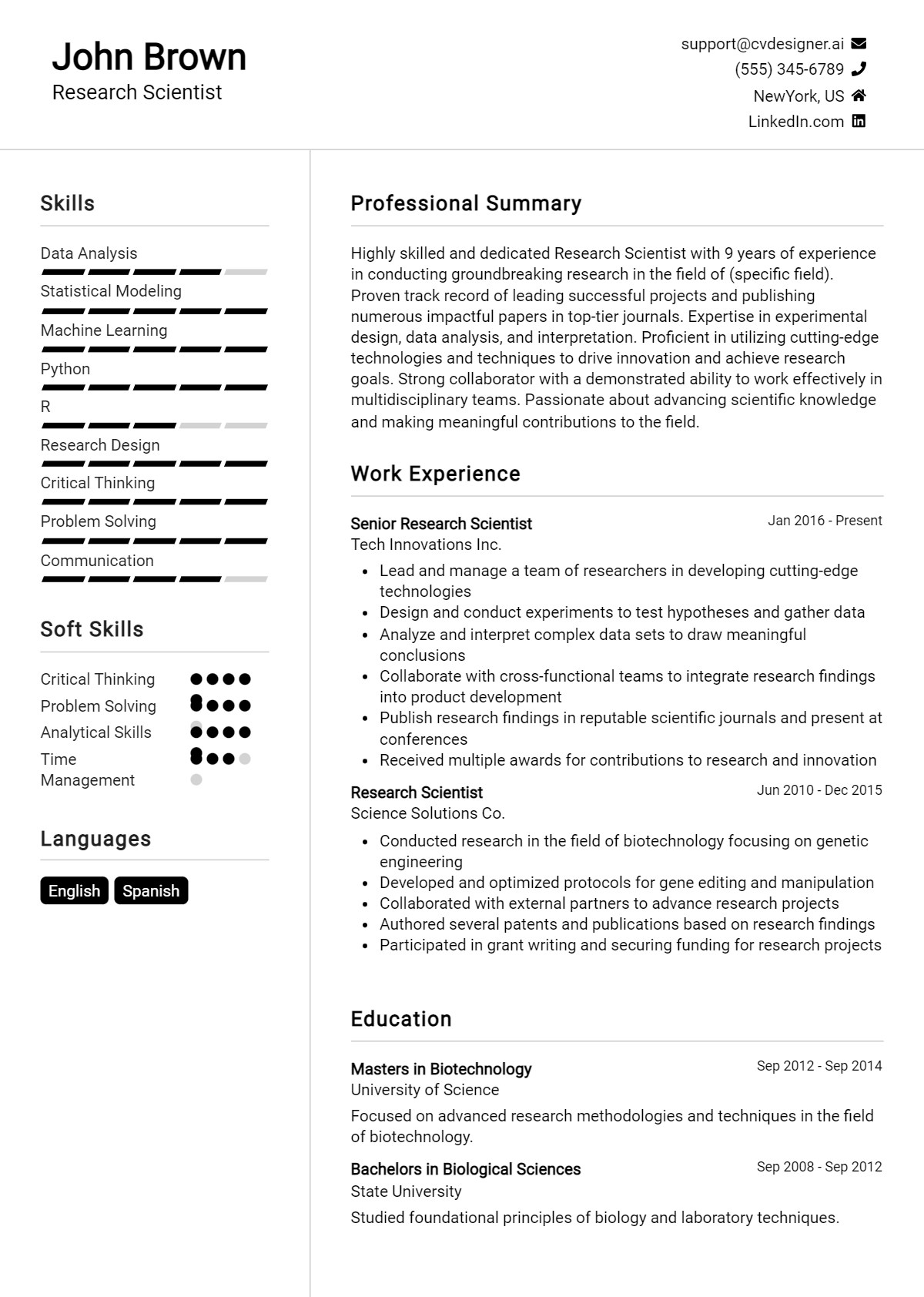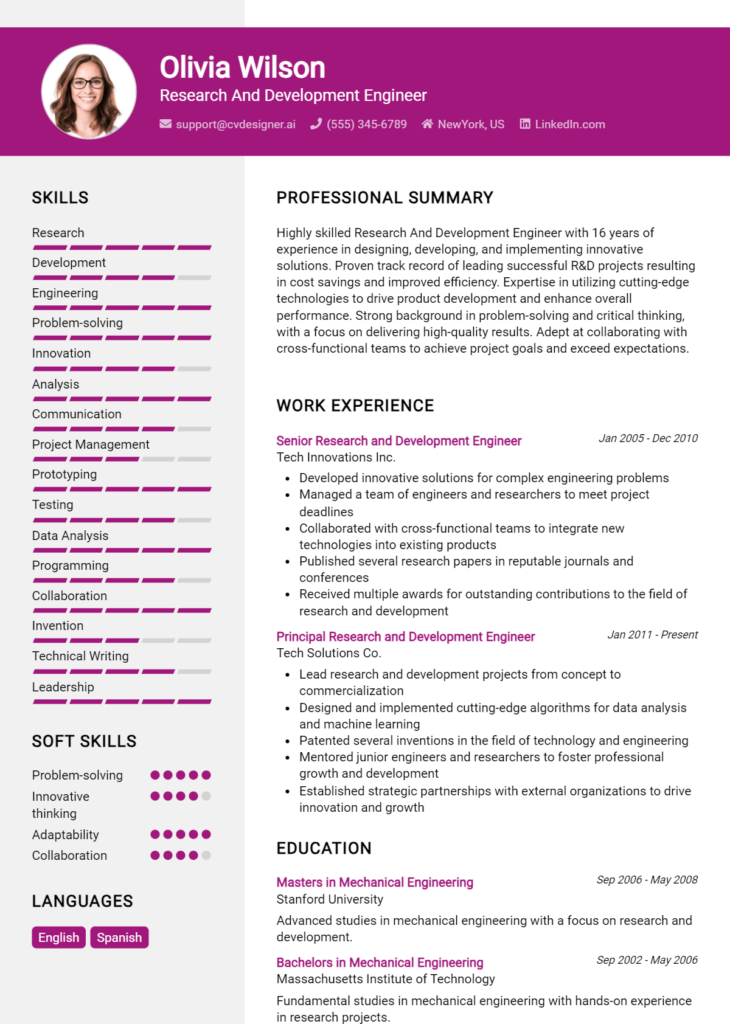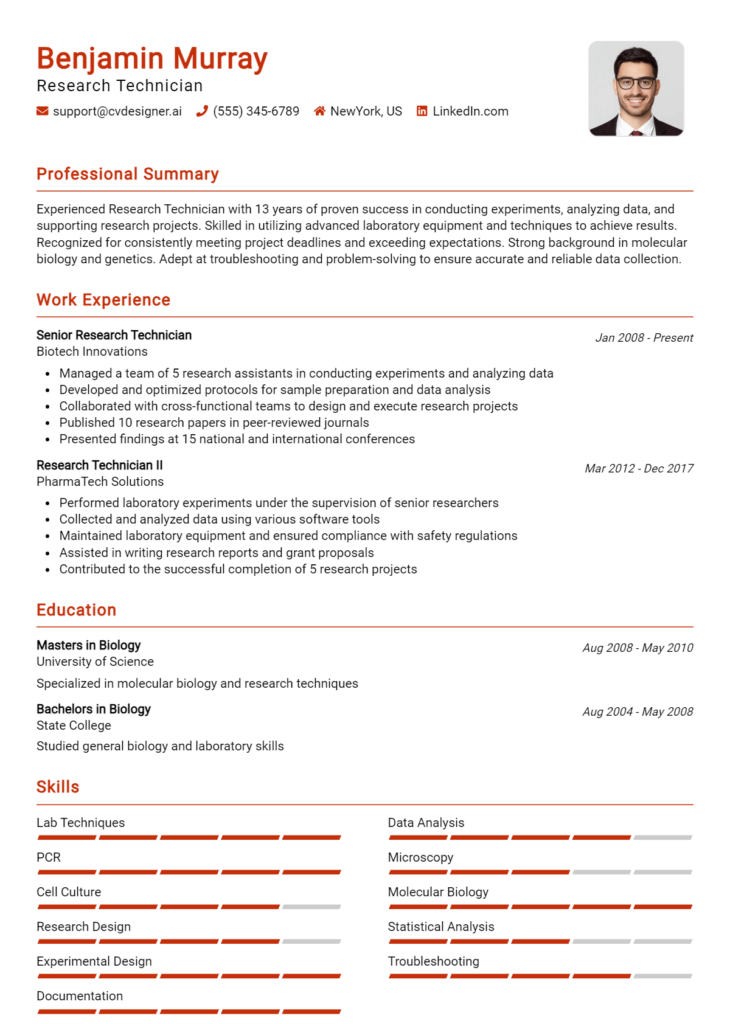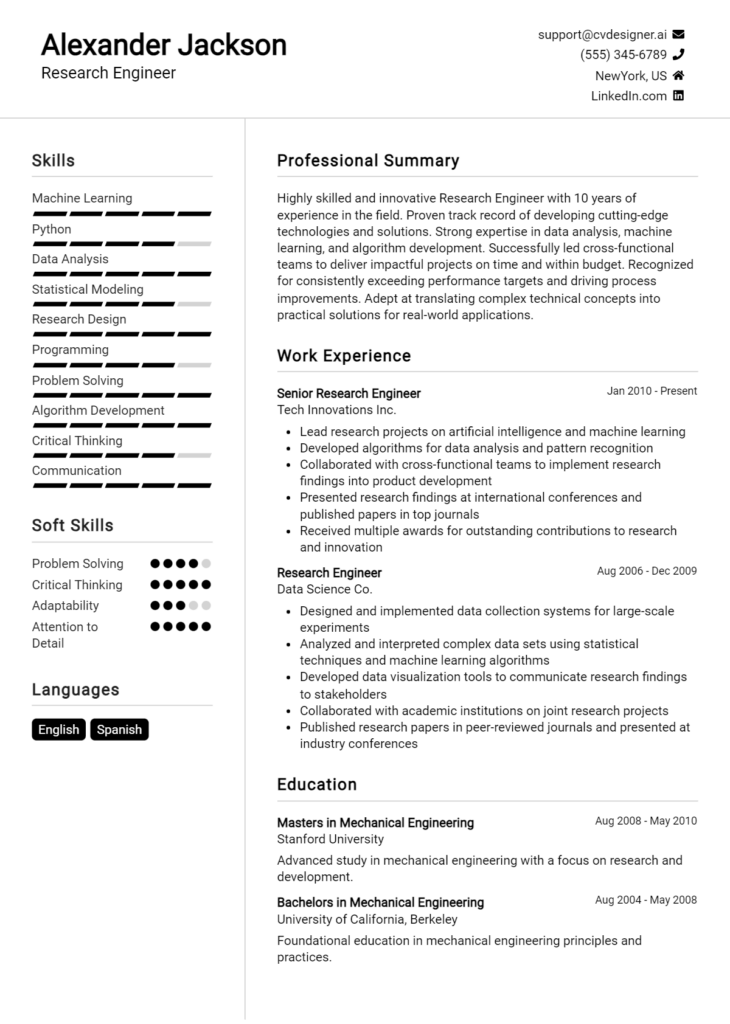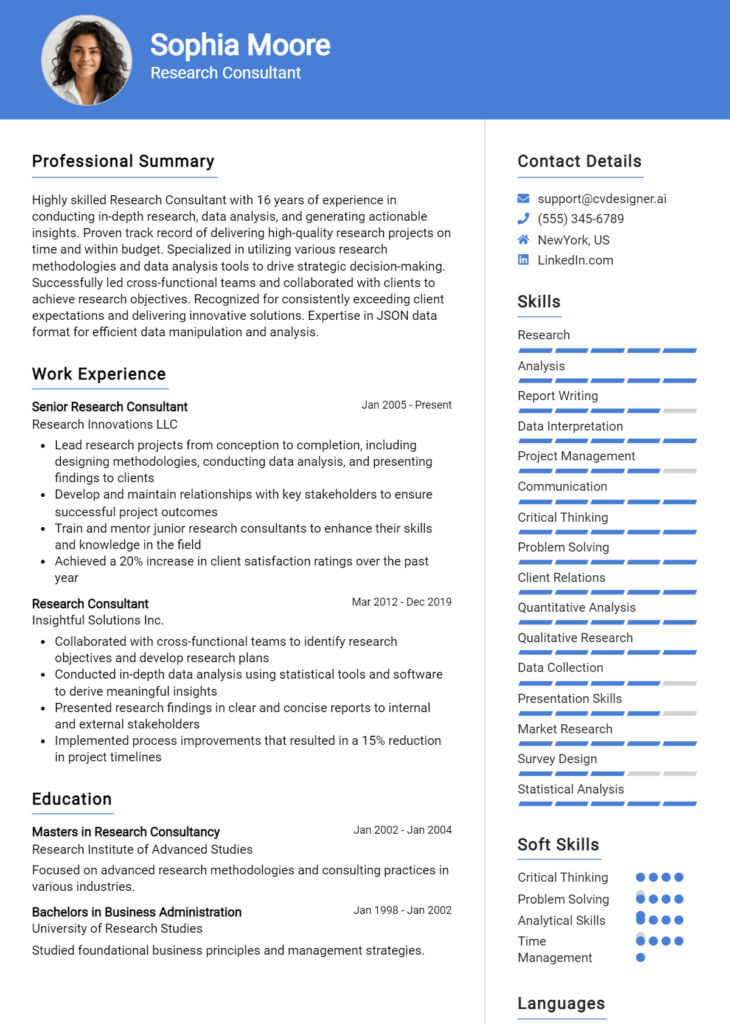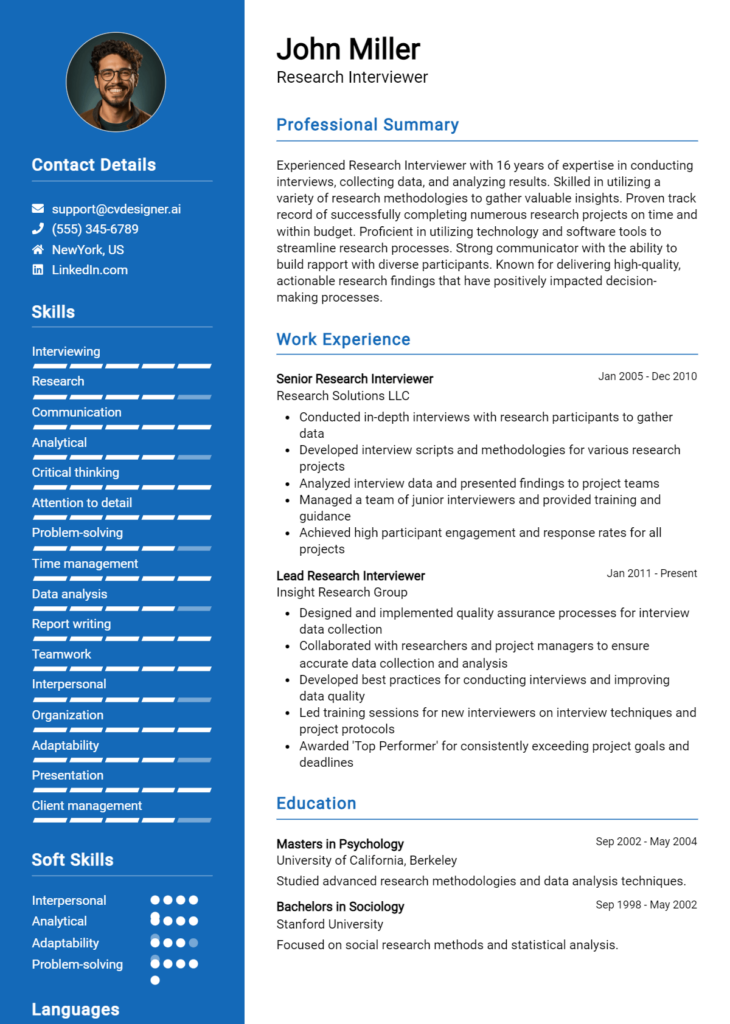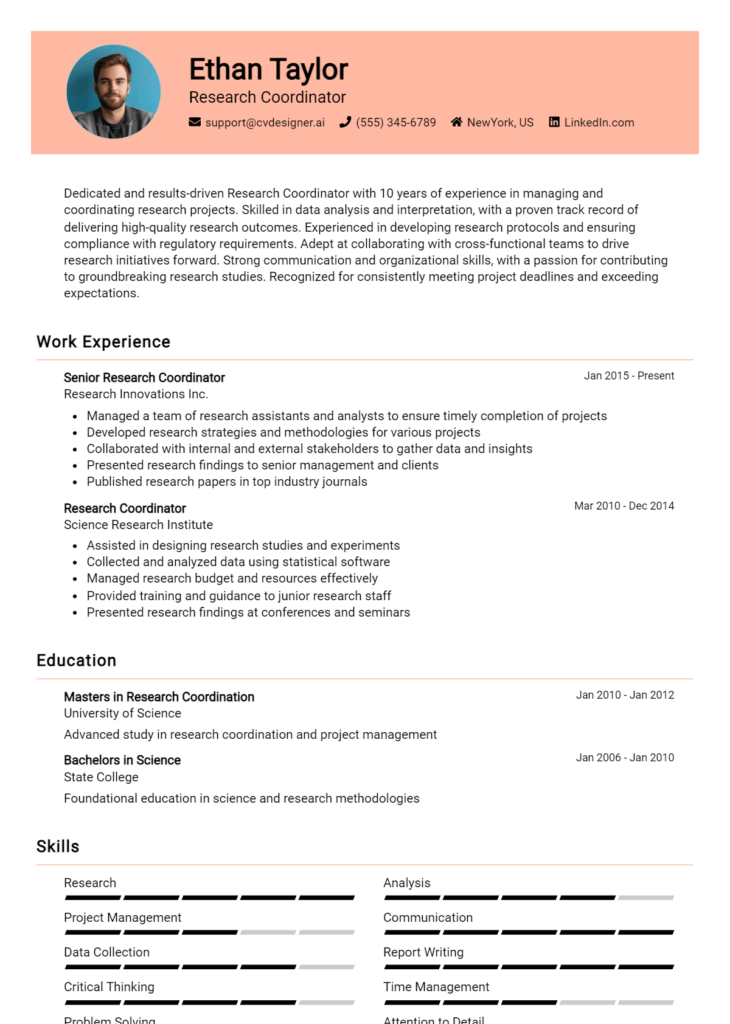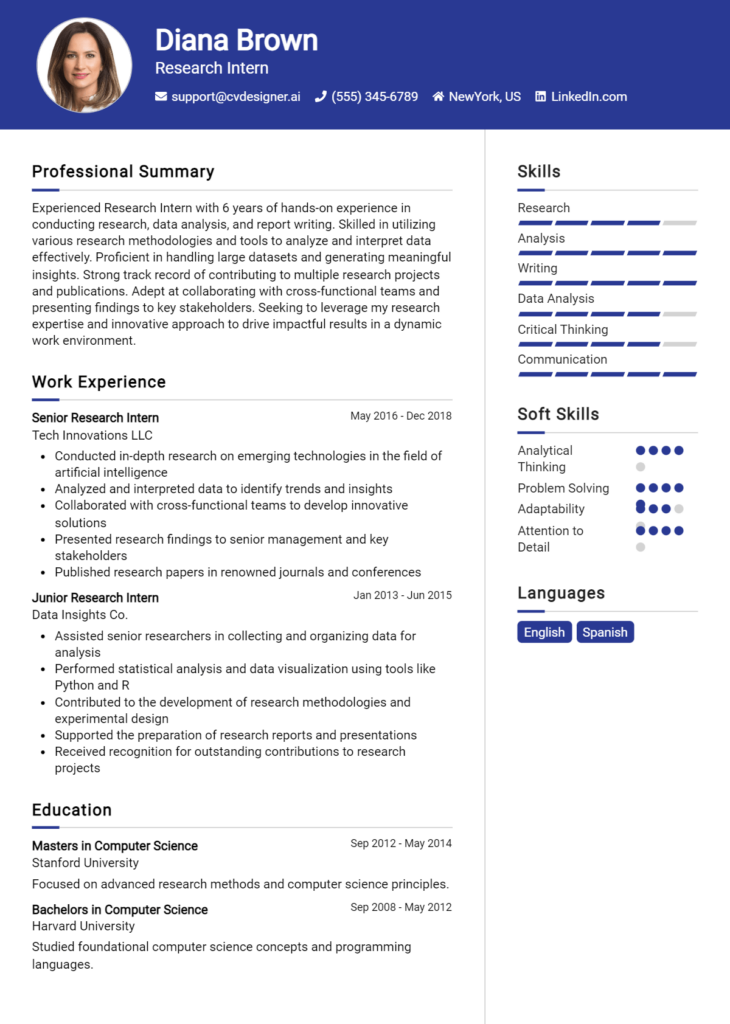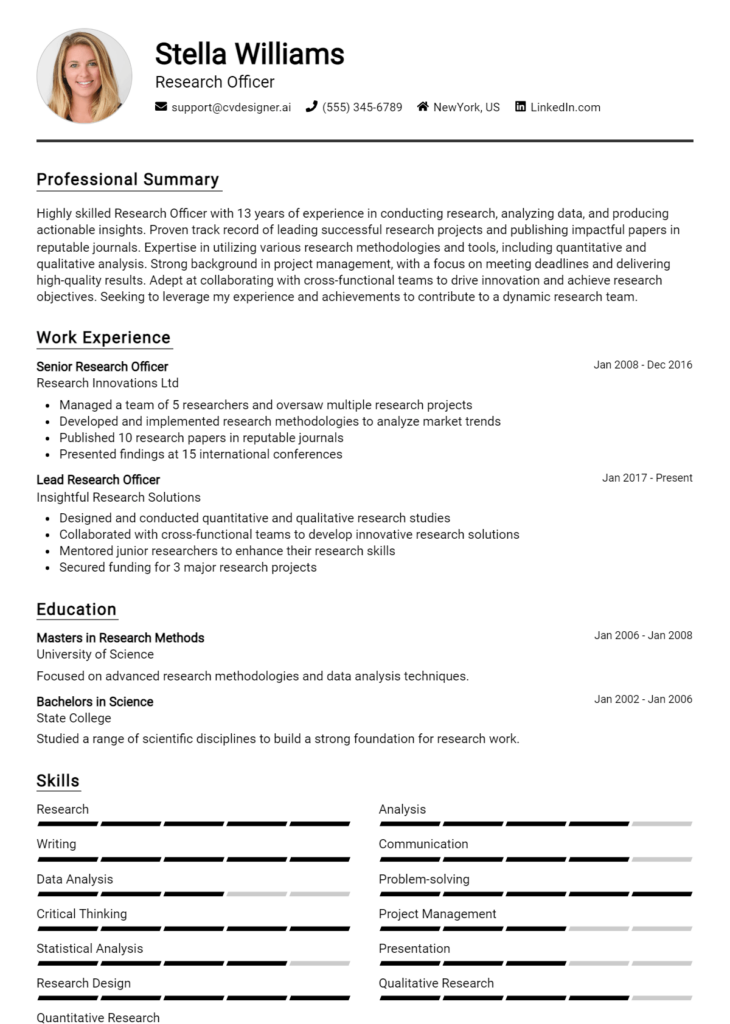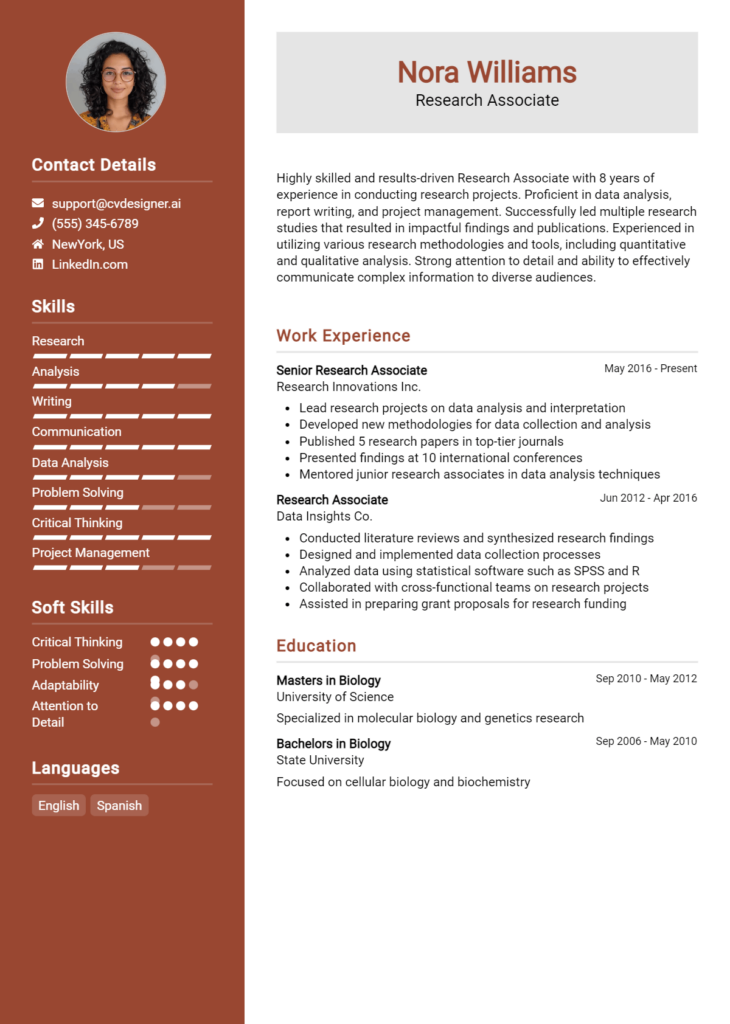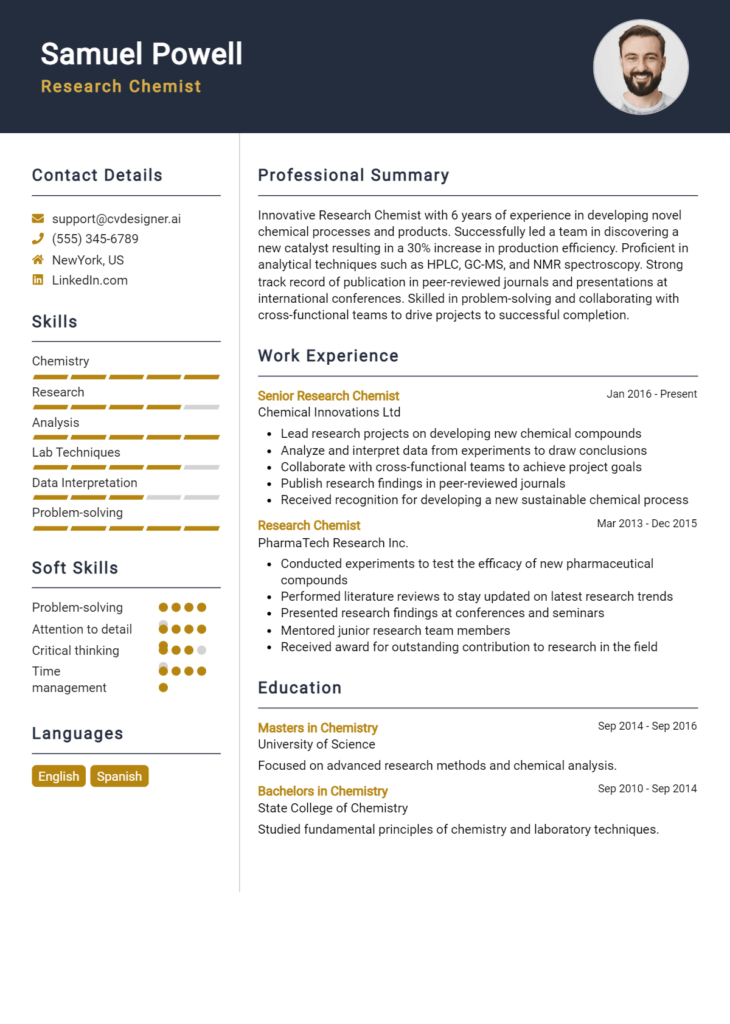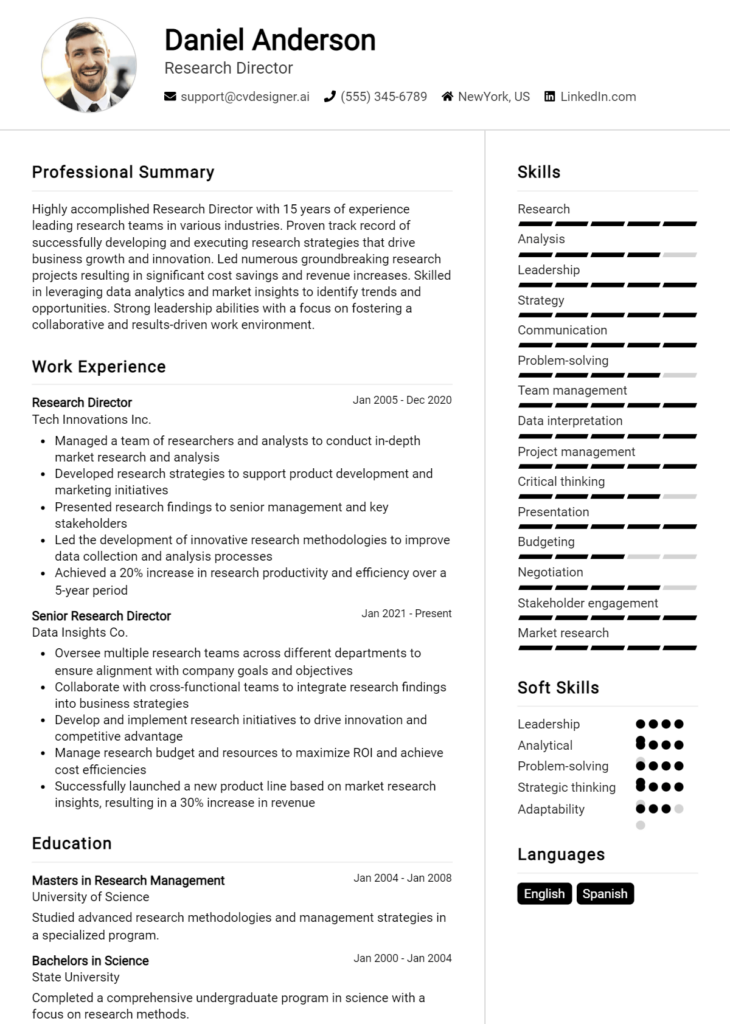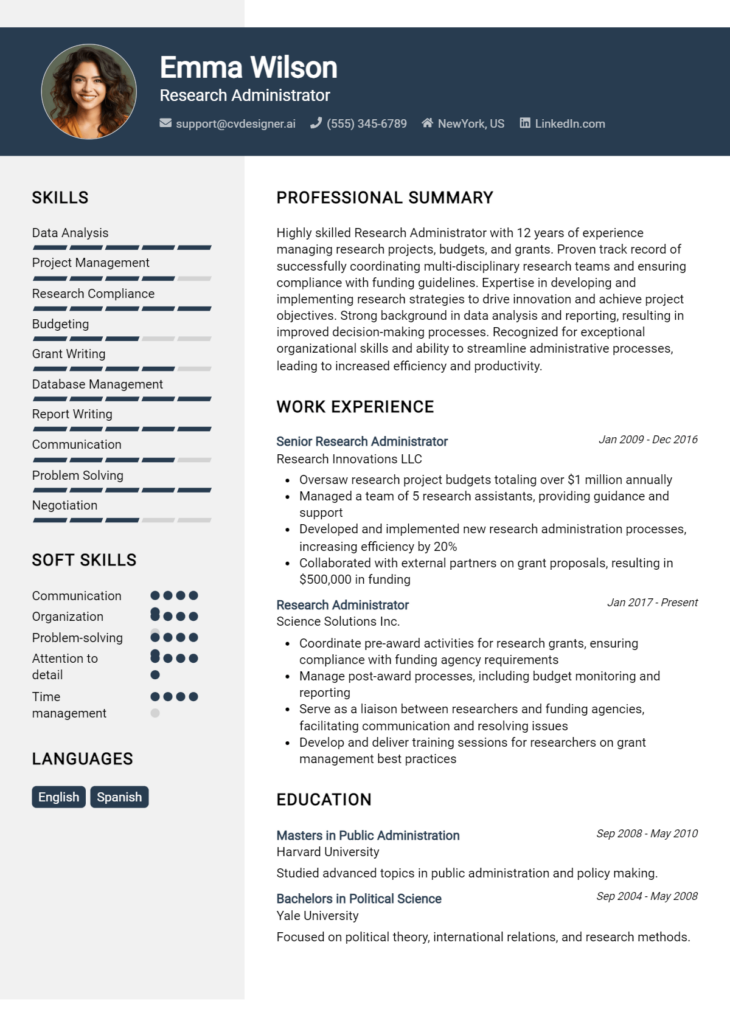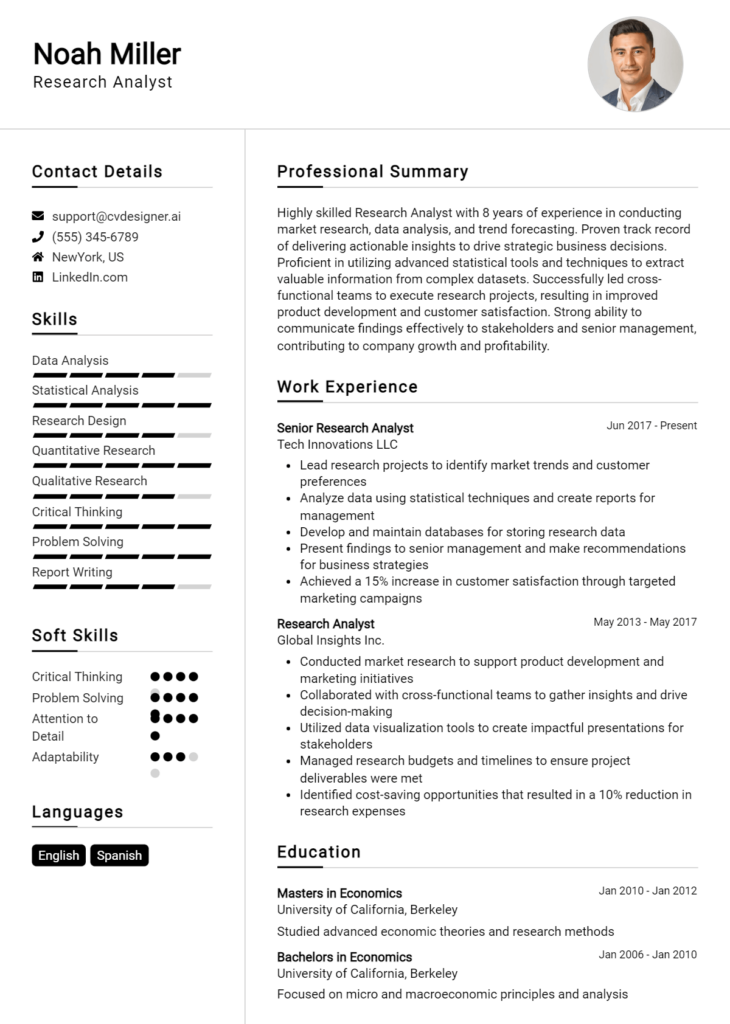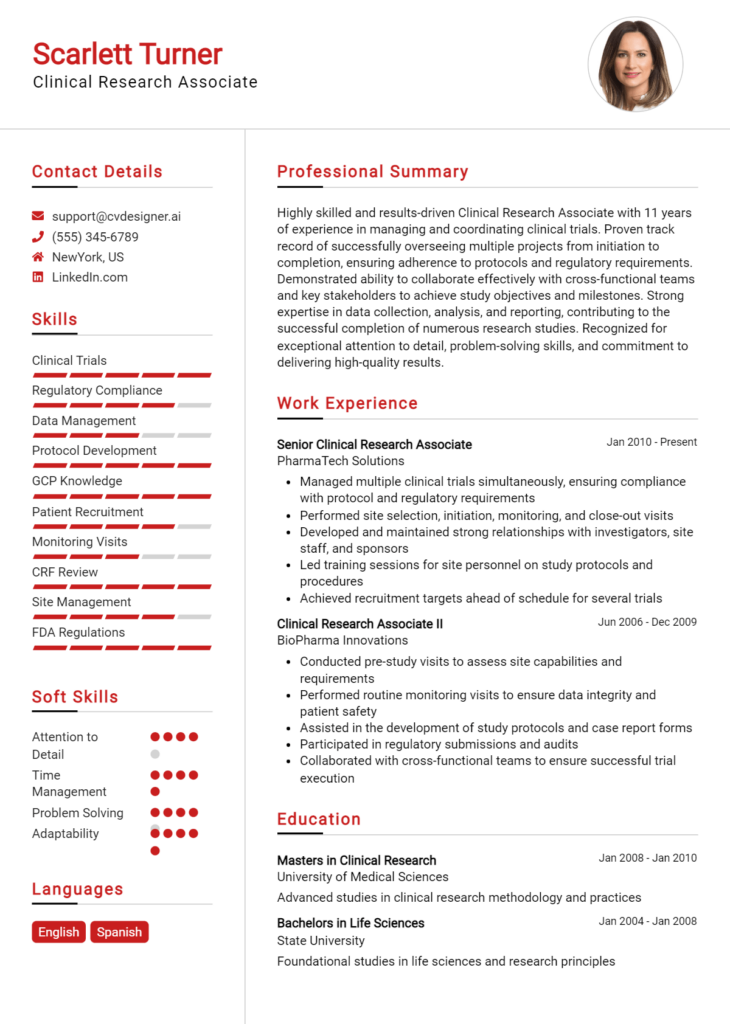Most Popular Research Scientist Resume Examples
Explore additional Research Scientist resume samples and guides and see what works for your level of experience or role.
As a Research Scientist, you stand at the forefront of innovation, driving discoveries that can change the world. Your work not only deepens our understanding of complex scientific phenomena but also contributes to advancements in technology, health, and environmental sustainability. Given the significance of this role, having a well-crafted resume is essential to showcase your expertise, research contributions, and unique skill set to potential employers. A compelling resume not only highlights your qualifications but also sets you apart in a competitive job market, making it crucial for your career advancement.
In this comprehensive Research Scientist resume writing guide, we will cover a variety of key points to help you create an impressive resume that resonates with hiring managers. You will learn about the primary responsibilities and skills that should be highlighted in your resume, as well as the best format to use for maximum impact. We will also discuss common mistakes to avoid and provide resume examples suitable for all career levels, from entry-level researchers to seasoned professionals. Additionally, you will find valuable tips on effective resume writing strategies and guidance on selecting the right resume templates that align with your professional image. Whether you are just starting out or looking to elevate your career, this guide will equip you with the tools you need to craft a standout resume.
Key Responsibilities and Skills for a Research Scientist
As a Research Scientist, you will play a critical role in advancing scientific knowledge through experimentation, data analysis, and innovative research methodologies. Your key responsibilities will include designing and conducting experiments, analyzing results, and interpreting data to draw meaningful conclusions. Collaboration with cross-functional teams, writing research papers, and presenting findings at conferences or seminars are also vital aspects of the role. Additionally, staying updated with the latest scientific literature and trends is crucial for driving impactful research.
Key Responsibilities:
- Design and conduct experiments to test hypotheses and gather data.
- Analyze and interpret complex datasets using statistical methods.
- Collaborate with interdisciplinary teams to integrate findings and develop new research directions.
- Prepare and present research findings in reports, journals, and conferences.
- Maintain accurate and detailed records of experiments and analyses.
- Ensure compliance with ethical guidelines and safety protocols in the laboratory.
Essential Skills:
- Proficiency in experimental design and statistical analysis.
- Strong analytical and problem-solving abilities.
- Excellent written and verbal communication skills.
- Familiarity with laboratory equipment and research methodologies.
- Ability to work collaboratively in a team-oriented environment.
- Strong attention to detail and organizational skills.
Highlighting these skills effectively in the resume skills section is essential for standing out to potential employers. Tailoring your responsibilities and skills to match the specific job description not only demonstrates your suitability for the position but also reflects your understanding of the role’s requirements. Consider how these skills can enhance your CV, showcasing your qualifications and experience in a way that aligns with the expectations of hiring managers in the field of research.
Best Resume Format and Structure for a Research Scientist
When crafting a resume for a Research Scientist position, it’s crucial to select a format that highlights your academic background, research experience, and technical skills. Here’s a detailed guide on the best resume format and structure for a Research Scientist.
Contact Information
Start your resume with your contact information at the top. This section should include:
- Full Name
- Phone Number
- Email Address
- LinkedIn Profile (optional but recommended)
- Location (City, State)
Professional Summary
Craft a concise professional summary that highlights your qualifications, research focus, and career objectives. This section should be 2-3 sentences long and capture your most relevant experience. Use strong action verbs and quantify your accomplishments when possible. For example:
“Dedicated Research Scientist with over 5 years of experience in molecular biology and a proven track record of leading cross-functional research projects that resulted in 3 published papers in peer-reviewed journals.”
Work Experience
List your relevant work experience in reverse chronological order, starting with your most recent position. For each job, include:
- Job Title
- Company Name
- Location (City, State)
- Dates of Employment (Month/Year – Month/Year)
- Bullet points outlining your responsibilities and achievements. Focus on quantifiable outcomes and specific techniques used. Use action verbs to begin each bullet point. For example:
- Developed and implemented experimental protocols for gene editing, resulting in a 30% increase in efficiency.
- Collaborated with a team of scientists to publish findings in a high-impact journal.
Education
In this section, provide details about your educational background, including:
- Degree(s) Earned (e.g., PhD in Biochemistry)
- Institution Name
- Location (City, State)
- Graduation Date (Month/Year)
If you have a strong academic background, you may also include relevant coursework, honors, or thesis titles.
Skills
Include a skills section that lists both technical and soft skills relevant to the Research Scientist role. Consider using bullet points or a two-column format for clarity. Common skills may include:
- Experimental design
- Statistical analysis (e.g., R, SPSS)
- Laboratory techniques (e.g., PCR, chromatography)
- Data interpretation and presentation
- Project management
- Team collaboration and mentorship
Certifications
If you have any relevant certifications, include them in this section. This can enhance your credibility and show your commitment to continued professional development. Examples might include:
- Certified Clinical Research Associate (CCRA)
- Good Laboratory Practice (GLP) Certification
- Laboratory Safety Certification
Additional Tips
- Use a clean, professional layout with consistent formatting throughout the resume. A chronological or combination format works best for Research Scientists as it emphasizes both experience and skills.
- Keep your resume to one or two pages, focusing on the most relevant information to the job you are applying for.
- Tailor your resume for each position by incorporating keywords from the job description to pass through Applicant Tracking Systems (ATS).
A well-structured resume complements a corresponding cover letter by providing a detailed overview of your qualifications while the cover letter can elaborate on your motivation, personality, and fit for the role. Ensure that the tone and style in both documents are consistent, which strengthens your overall application.
Utilizing this format will help you present your qualifications effectively and enhance your chances of securing a Research Scientist position.
Writing Tips and Best Practices for a Research Scientist Resume
When crafting a resume as a Research Scientist, it’s essential to present your qualifications and achievements clearly and compellingly. Focus on showcasing your technical skills, research experience, and contributions to scientific advancements. Use concise language and a clean layout to enhance readability. Remember, the goal is to highlight your unique strengths while ensuring that your resume aligns with the job description. Utilizing resume writing tips can help you create a polished document that stands out in a competitive field. Additionally, many of these practices are equally important when drafting a cover letter, so keep that in mind.
- Start bullet points with strong action verbs to convey your impact (e.g., "developed," "analyzed," "led").
- Quantify your achievements where possible, such as specifying the number of projects completed or the percentage increase in efficiency.
- Incorporate industry-specific keywords from the job description to ensure your resume passes through applicant tracking systems (ATS).
- Highlight relevant technical skills, including software, methodologies, and instruments you are proficient in.
- Tailor your resume to the specific role you are applying for by emphasizing the most relevant experiences.
- Include publications, presentations, and patents in a dedicated section to showcase your contributions to the field.
- Maintain a clean, professional format with consistent fonts and spacing to enhance visual appeal and readability.
- Use a summary statement at the beginning of your resume to articulate your career goals and primary qualifications succinctly.
Common Mistakes to Avoid in a Research Scientist Resume
When crafting a resume for a Research Scientist position, it's crucial to present your qualifications and experiences effectively. However, many candidates fall into common pitfalls that can undermine their chances of landing an interview. To stand out in a competitive field, it's important to avoid these mistakes that can dilute your expertise and achievements. Below are some of the most frequent errors to watch out for:
- Overloading the resume with excessive information, making it difficult to read.
- Using generic descriptions that fail to highlight specific skills or accomplishments.
- Failing to tailor the resume for the specific job, leading to a lack of relevance.
- Not including quantifiable achievements, which can demonstrate the impact of your work.
- Overusing jargon or technical terms without context, which may alienate non-specialist reviewers.
- Ignoring the importance of formatting; a cluttered layout can detract from the content.
- Neglecting to proofread, resulting in typos or grammatical errors that can undermine professionalism.
- Listing responsibilities instead of focusing on accomplishments and outcomes.
- Not including essential keywords from the job description, which can hinder applicant tracking system (ATS) compatibility.
- Failing to highlight relevant publications or presentations that showcase your research contributions.
To ensure your resume is as effective as possible, consider reviewing the common mistakes to avoid in a resume. Additionally, don’t overlook the importance of a strong cover letter; refer to the common cover letter mistakes to ensure your application package is polished and compelling.
Sample Research Scientist Resumes
As a Research Scientist, your resume serves as a critical tool in showcasing your expertise, skills, and experience in a competitive job market. Below are three sample resumes tailored to different career stages: an experienced professional, an entry-level candidate, and a career changer. These examples illustrate how to effectively highlight your qualifications and make a strong impression on potential employers.
Sample Resume: Experienced Research Scientist
Jane Doe
123 Science Blvd
City, State, ZIP
(123) 456-7890
janedoe@email.com
Professional Summary
Accomplished Research Scientist with over 10 years of experience in molecular biology and biochemistry. Proven track record of leading innovative research projects, publishing findings in peer-reviewed journals, and collaborating with interdisciplinary teams. Adept at utilizing cutting-edge technologies to drive scientific advancement and improve laboratory efficiency.
Education
Ph.D. in Molecular Biology
University of Science, City, State
Graduated: May 2012
B.S. in Biochemistry
University of Technology, City, State
Graduated: May 2008
Professional Experience
Senior Research Scientist
Innovative BioTech, City, State
June 2015 - Present
- Led a team of 5 scientists in research projects focused on gene editing techniques, resulting in a 30% increase in project efficiency.
- Published 15 articles in high-impact journals, contributing to the scientific community's understanding of CRISPR technology.
- Collaborated with industry partners to secure $1M in funding for ongoing research initiatives.
Research Scientist
Genetic Solutions, City, State
June 2012 - May 2015
- Conducted experiments on protein interactions, contributing to a major breakthrough in drug development.
- Managed laboratory operations, ensuring compliance with safety regulations and maintaining high-quality standards.
- Mentored junior researchers and interns, fostering a collaborative and productive work environment.
Skills
- Molecular Biology Techniques
- Data Analysis and Interpretation
- Project Management
- Team Leadership
Sample Resume: Entry-Level Research Scientist
John Smith
456 Research Rd
City, State, ZIP
(987) 654-3210
johnsmith@email.com
Objective
Motivated and detail-oriented recent graduate with a B.S. in Biology seeking an entry-level Research Scientist position. Eager to apply laboratory experience and strong analytical skills to contribute to innovative research projects.
Education
B.S. in Biology
University of Nature, City, State
Graduated: May 2023
Relevant Experience
Research Intern
Green Lab, City, State
January 2023 - May 2023
- Assisted in conducting experiments on plant genetics, contributing to a project aimed at improving crop yield.
- Utilized statistical software to analyze experimental data and present findings to senior researchers.
- Maintained laboratory equipment and ensured compliance with safety protocols.
Laboratory Assistant
University of Nature, City, State
September 2022 - December 2022
- Supported ongoing research projects by preparing samples and conducting preliminary analyses.
- Collaborated with a team of students to design and execute experiments as part of a senior thesis project.
Skills
- Lab Techniques (PCR, Gel Electrophoresis)
- Data Analysis (Excel, SPSS)
- Strong Communication Skills
- Team Collaboration
Sample Resume: Career Changer to Research Scientist
Emily Johnson
789 Innovation St
City, State, ZIP
(321) 654-9870
emilyjohnson@email.com
Professional Summary
Dedicated professional transitioning from a successful career in pharmaceuticals to research science. Holds a Master’s in Chemistry and possesses strong analytical and problem-solving skills. Committed to applying diverse experience to advance scientific research and contribute to impactful projects.
Education
M.S. in Chemistry
University of Chemistry, City, State
Graduated: December 2022
B.S. in Pharmaceutical Sciences
University of Health, City, State
Graduated: May 2018
Professional Experience
Pharmaceutical Sales Representative
Health Corp, City, State
January 2019 - November 2022
- Developed a deep understanding of drug formulations and mechanisms which sparked interest in research science.
- Collaborated with healthcare professionals to provide insights on pharmaceutical products and their scientific basis.
- Conducted market research to identify emerging trends in pharmaceuticals and biotechnology.
Research Assistant (Internship)
Chemistry Lab, University of Chemistry, City, State
September 2022 - December 2022
- Engaged in hands-on research focusing on the synthesis of novel compounds for drug discovery.
- Assisted in experimental design and data collection, contributing to a team project that was presented at a national conference.
Skills
- Chemical Analysis
- Research Methodologies
- Strong Interpersonal Skills
- Detail-Oriented
For more inspiration, explore additional resume templates. Additionally, don't forget to check out corresponding cover letter examples to complete your job application package and enhance your chances of landing your desired position.
Checklist for a Research Scientist Resume
- Proofread for Errors: Carefully review your resume for spelling, grammar, and punctuation mistakes. A clean, error-free document conveys professionalism.
- Check for Consistency: Ensure consistent formatting throughout, including font size, style, bullet points, and spacing. This creates a polished and cohesive look.
- Tailor to the Job Description: Customize your resume to highlight experiences and skills that align with the specific requirements of the Research Scientist position you are applying for.
- Use Action Verbs: Begin bullet points with strong action verbs (e.g., "Conducted," "Developed," "Analyzed") to convey your contributions effectively and dynamically.
- Include Relevant Keywords: Incorporate keywords from the job posting to improve your chances of passing through Applicant Tracking Systems (ATS) and catching the hiring manager's attention.
- Highlight Achievements: Focus on quantifiable achievements and results from your research work. Use metrics to demonstrate the impact of your contributions.
- Keep it Concise: Aim for clarity and brevity. Limit your resume to one or two pages, focusing on the most relevant experiences and skills.
- Check for Contact Information: Ensure your contact details are up-to-date and prominently displayed at the top of the resume, including your name, phone number, and professional email address.
- Utilize an AI Resume Builder: Consider using an AI resume builder to ensure all elements are well-organized and easily formatted for readability.
- Apply Similar Principles for CVs and Cover Letters: Remember that you can use a similar checklist when creating a CV or cover letter, ensuring consistency across all your application materials.
Key Takeaways for a Research Scientist Resume Guide
In conclusion, crafting an effective Research Scientist resume is essential for showcasing your unique qualifications and experiences in this competitive field. By utilizing the examples and tips provided in this guide, you can create a resume that highlights your research expertise, technical skills, and accomplishments. We encourage you to take the next steps by downloading a tailored template from our resume templates or exploring our cover letter templates to complement your application. Additionally, consider using our best resume maker for a seamless experience in building your professional profile. Remember, following similar guidelines will not only enhance your resume but also aid in crafting a compelling CV and cover letter that stand out to potential employers. Start your journey towards securing your desired position by leveraging these resources today!
